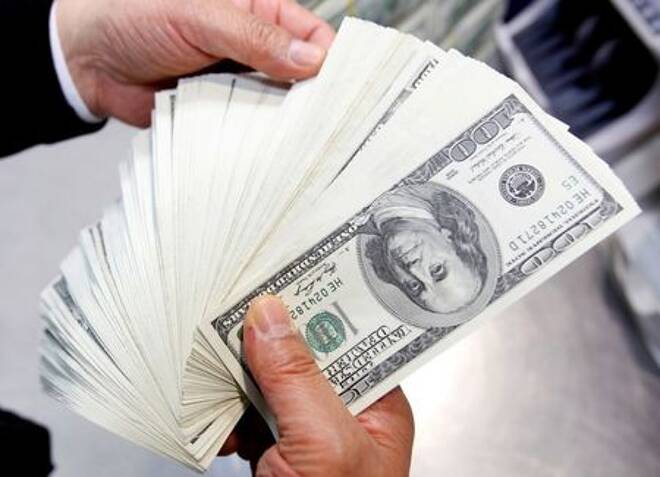Advertisement
Advertisement
Dollar Steadies After Bounce Off of One-Month Low
By:
NEW YORK (Reuters) - The dollar steadied on Monday afternoon after bouncing off a one-month low as traders weighed the prospects of higher interest rates for different currencies and considered how coming economic data and central bank comments could impact their positions.
The upward move came at the expense of the euro, the Japanese yen and the Swiss franc. The change seemed to indicate that the market had taken the dollar down too much recently on expectations that inflation outside the U.S. will force up interest rates for other currencies faster than for the greenback.
The dollar index against major currencies steadied with a gain of nearly 0.2% for the day after turning up from a one-month low in early trading. Before the turn, the index had lost 1% over two weeks.
Threats to current positions could come on Thursday from the European Central Bank and from U.S. economic data and from U.S. and European inflation data on Friday, as well as a meeting of the Bank of Canada on Wednesday.
The U.S. Federal Reserve meets next week.
“There’s so much event risk on tap this week and the dollar has underperformed over the last two weeks that the market’s starting to buy back the dollar,” said Joseph Manimbo, senior market analyst at Western Union Business Solutions.
“What had dulled the dollar’s shine of late is this notion that other central banks appear poised to raise rates before the Fed,” he said.
At one point the dollar index was up 0.4% on the day as the yield on the 10-year U.S. Treasury rose. The dollar eased off and the 10-year yield fell back, and was last around 1.63% and little changed for the day. Crude oil, too, climbed and then eased for the day.
The euro lost 0.3% to $1.1613.
The European Central Bank meeting on Thursday is not expected to make big news but comments from the bank could shift views on how much inflationary pressures could impact interest rates.
“There is no way that they (ECB policymakers) can’t acknowledge that inflation has run higher, but also they do not want to get dragged into a game of expectations given the ECB’s dovish proclivities,” said Jeremy Thomson-Cook, chief economist at payments firm Equals Money.
“Alongside inflation and growth data due this week, we will be able to mark the European economy a lot better against its UK and U.S. counterparts, something we expect to continue to allow for additional euro weakness moving forward.”
The dollar chalked up gains versus the Japanese yen, rising 0.2% to 113.685 yen. The Bank of Japan meets later this week. But like the ECB, it is not expected to shift from its dovish policy stance.
Thursday’s U.S. gross domestic product figures — if they show an expected slowdown — could take some pressure off the Fed even while inflation runs relatively hot.
Cryptocurrency with bitcoin was up 3% at $62,997 after last week reaching $67,000.
For a look at all of today’s economic events, check out our economic calendar.
(Reporting by David Henry in New York and Tommy Wilkes in London. Editing by Peter Graff and Chizu Nomiyama)
About the Author
Reuterscontributor
Reuters, the news and media division of Thomson Reuters, is the world’s largest international multimedia news provider reaching more than one billion people every day. Reuters provides trusted business, financial, national, and international news to professionals via Thomson Reuters desktops, the world's media organizations, and directly to consumers at Reuters.com and via Reuters TV. Learn more about Thomson Reuters products:
Advertisement
